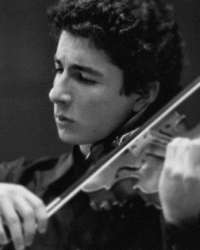 J.Sibelius / S.Kha Khachatryan / Krivine / Sinfonia Varsovia naïve     |
Yuri Temirkanov was not able to conduct (and won’t be, for a while), because a friend’s recent passing keeps him in St. Petersburg (back problems were the reason he extended his vacation the last time…), and so associate conductor Andrew Constantine stepped in. In the seemingly well-rehearsed and faultlessly played Sibelius concerto, his good work was noticeable, if not particularly distinctive. But in the second half of the program – Prokofiev’s Ugly Duckling, op. 18, and the first of the three Cinderella Suites (op. 107) he led a marvelously playing BSO to such grandeur that Maestro Temirkanov wouldn’t be missed even if he didn’t return until his farewell performance of Mahler’s second symphony. “Fairy Grandmother and Winter” was particularly well structured and the concluding “Midnight” scene was rousing. He was visibly pleased with the orchestra and the orchestra with itself. In a way it was Constantine who was the concert’s real discovery.
Mark J. Estren, Constantine, Khachatryan Take BSO to Great Heights (Washington Post, March 4) Tim Smith, An expressive debut with BSO (Baltimore Sun, March 4) |
 Before Khachatryan’s appearance, the orchestra introduced itself with one of its fanfares rather than an orchestra member’s speech (much appreciated), but Adolphus Hailstork’s Intrada was slight and the applause mild. The Sibelius was a different story, altogether. Unfailing and soft in the beginning with a beautiful slow crescendo; an assertive piano slowly melting into a modest but commanding mf. Khachatryan’s sound had a few wooden moments after that, but soon returned to his pleasant tone that reminds a little of the leathery late Milstein’s – just less focused. That alone is highest possible praise and, despite Sergey Khachatryan’s nascent stardom, highly regarded recordings, and his standing as one of the young violinists ‘to watch’, overshooting a little. No doubts that his command of instrument and work are splendid and his performance notably more assured than the recent one of Ryo Goto who was supported paternally, lovingly, by Ashkenazy’s direction. But his vibrato – especially in the slow movement – was applied in liberal quantities, to a point where one hopes it doesn’t get much wider… and the beginning of the finale (Allegro ma non tanto, in this case a.k.a. “as fast as you can play it”) was less than coherent in a few moments, his Huggins revealing a bit of a boxy sound in the low register. But then the last passages of this fiendishly difficult concerto and movement were exemplary again and worth having gone to Strathmore for, alone. Khachatryan a great violinist? Yes: In the making.
Before Khachatryan’s appearance, the orchestra introduced itself with one of its fanfares rather than an orchestra member’s speech (much appreciated), but Adolphus Hailstork’s Intrada was slight and the applause mild. The Sibelius was a different story, altogether. Unfailing and soft in the beginning with a beautiful slow crescendo; an assertive piano slowly melting into a modest but commanding mf. Khachatryan’s sound had a few wooden moments after that, but soon returned to his pleasant tone that reminds a little of the leathery late Milstein’s – just less focused. That alone is highest possible praise and, despite Sergey Khachatryan’s nascent stardom, highly regarded recordings, and his standing as one of the young violinists ‘to watch’, overshooting a little. No doubts that his command of instrument and work are splendid and his performance notably more assured than the recent one of Ryo Goto who was supported paternally, lovingly, by Ashkenazy’s direction. But his vibrato – especially in the slow movement – was applied in liberal quantities, to a point where one hopes it doesn’t get much wider… and the beginning of the finale (Allegro ma non tanto, in this case a.k.a. “as fast as you can play it”) was less than coherent in a few moments, his Huggins revealing a bit of a boxy sound in the low register. But then the last passages of this fiendishly difficult concerto and movement were exemplary again and worth having gone to Strathmore for, alone. Khachatryan a great violinist? Yes: In the making. 
